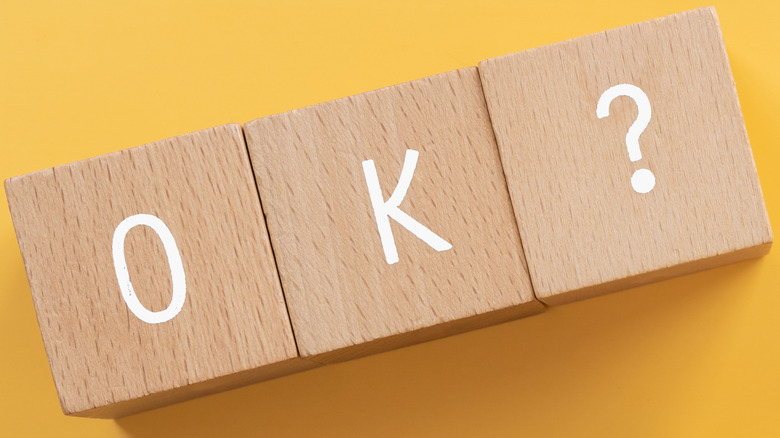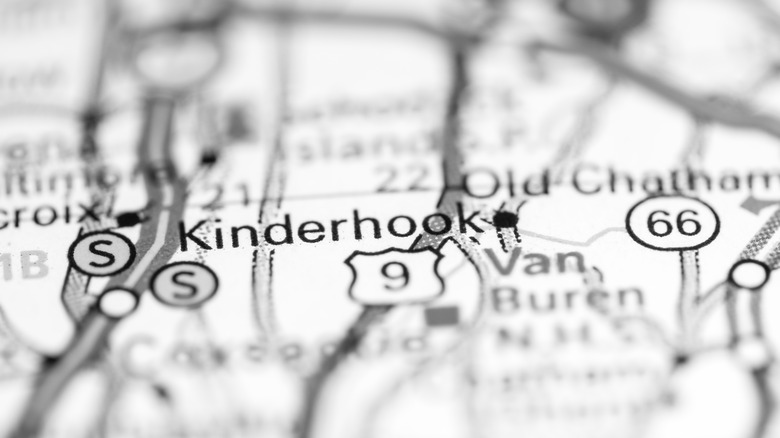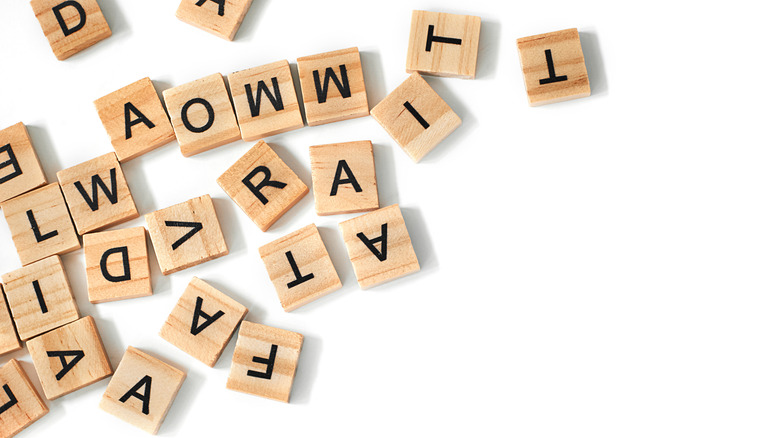What Does OK Stand For And Where Did It Originate?
Acronyms are so commonplace that you probably don't even think twice when you use them. The internet and rise of cell phones popularized plenty of them, from classic combinations like "LOL" and "BRB," to more recent additions like "FYP." But shorthand like this isn't just the result of the modern age. In fact, acronyms like this have been popular for hundreds of years, and some are so normalized now that you may not even realize you're using them.
One such acronym is OK. The word is one of the most common in the English language, says the BBC, but its origins caused debate for decades among linguists and scholars. There are similar words in other cultures and languages, and several countries have tried to claim responsibility for its creation. But the most common explanation, or at least the most widely supported, claims that the word "OK" is in fact an acronym for something else — and it all started as a joke (via Merriam-Webster Dictionary).
Have a sense of humor
Credit for finding the origins of the word OK usually goes to historian Allan Walker Read, who looked into the question for fun on the side of his regular research (via The Economist). Read looked at a lot of different theories, but the one he found to be the most viable is from Boston, Massachusetts.
In the 1800s, newspapers in the United States relied on each other to exchange news about what was going on in other towns, according to Merriam-Webster. Without the internet, modern-day wire services, and other methods of exchanging content, they ended up with a lot of empty space. As a result, they looked a little different from what we know today. Journalists would often take that empty space and fill it with jokes about politics and news of the day (via Daily Writing Tips). That includes misspelling words for comedic effect, and — you guessed it — adding in nonsense acronyms.
Where did OK fit in?
Those journalistic documents, according to Allan Walker Read's research at Merriam-Webster, are where we can find the origin of OK. Read eventually tracked down what he claims is the first use of the term in Boston's Morning Post in 1839, according to The Economist. There, he found an article from a journalist who relied on those trends of misspelling words to create the acronym. The term "o.k.," at least according to this paper, stood for "oll correct" — an intentional misspelling of the phrase "all correct" (via Merriam-Webster).
The term might have fallen by the wayside after that, as have plenty of others that were written at the time, according to Merriam-Webster, such as O.K.K.B.W.P., for "one kind kiss before we part." Just publishing the term in a newspaper didn't mean it was going to take off and stick around for centuries. So what was it that kept O.K. in the spotlight?
An assist from politicians
"O.K." might have disappeared if it weren't for some assistance from a surprising place: the 1840 presidential election (per Merriam-Webster). Then-presidential candidate Martin Van Buren's supporters popularized the acronym as part of the campaign, because of Van Buren's birthplace. He was from Kinderhook, New York, and became known as "Old Kinderhook" to the American public (via BBC).
That was based on the nickname of the previous president, Andrew Jackson, according to Daily Writing Tips, who was known as "Old Hickory." Van Buren tried to associate himself with Jackson to better his chances at winning the presidency, according to Daily Writing Tips.
"Old Kinderhook" was then shortened to "O.K.," according to Merriam Webster, and campaign events were called "OK Clubs." Those campaign decisions are likely a large part of why the acronym stuck around so much longer than its counterparts, according to BBC, and eventually came to be a regular part of English speakers' vocabulary.
Other debated origin stories
The term "OK" now serves an important role in the English language. It can be a verb, a noun, an adjective, or an adverb. Especially in a world of social media and texting, it's nice to have a two-letter reply to send off to say "got it." The word bears a striking similarity to those in other languages that serve the same purpose, which is part of why it was so hard to determine a definite origin early on (via Mental Floss).
For starters, Choctaw Native Americans had used the term "okeh" before the abbreviation was popularized, according to BBC. Another theory connected "OK" to a similar word that was common in languages used in West Africa, according to Lexico, and posited that the phrase originated with Black slaves. As far as evidence goes, research has found more to support the "oll korrect" origin, according to Lexico.
Allan Walker Read, the historian who proposed the current popular origin story, was open to any evidence that would contradict it, according to The Economist. "Nothing is absolute, nothing is forever," he wrote.
Spelling is still up in the air
Just as much as the origin of the term "OK" was up for debate, there are plenty of options for how you can spell it. There's the typical "OK," or lowercase "ok." Some will even opt to spell it out phonetically as "okay." None of the options are technically incorrect, according to Merriam-Webster, although the original spelling was deliberately "o.k." The abbreviation was more popular with businessmen and politicians than it was with popular writers at the time, according to BBC, even those who frequently used other slang. But Louisa May Alcott chose to use the word in the 1868 edition of her novel "Little Women," where it was written out as "okay." (In the 1880 edition "okay" was swapped out for "cozy") (via Merriam-Webster).
The term "OK" serves a lot of purposes in our world today. Perhaps its popularity is because it uses a neutral voice, as BBC suggests. If you opt to say OK, it doesn't have to be positive or negative — it just is. That, according to the BBC, sets it apart from many other words in the English language.





